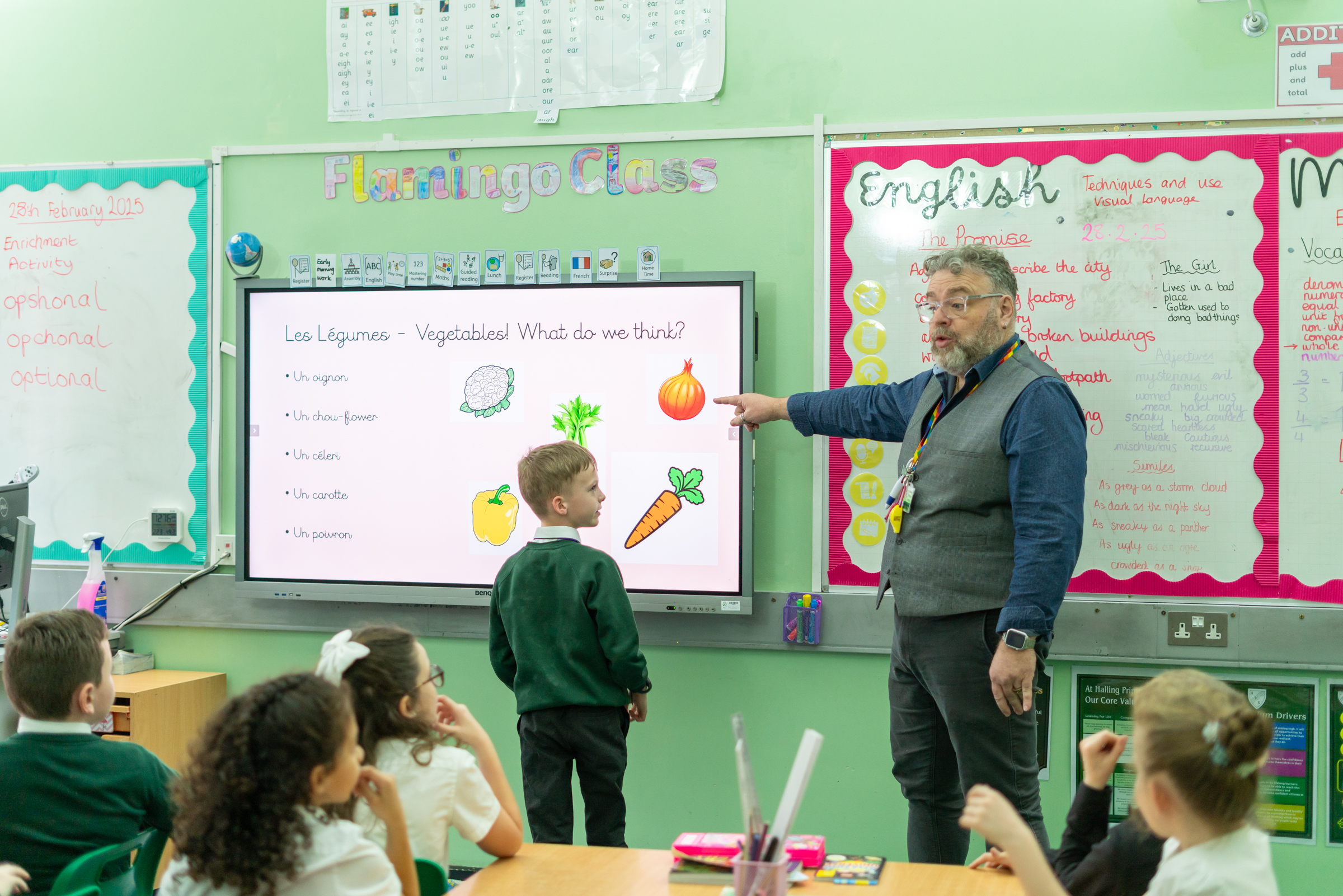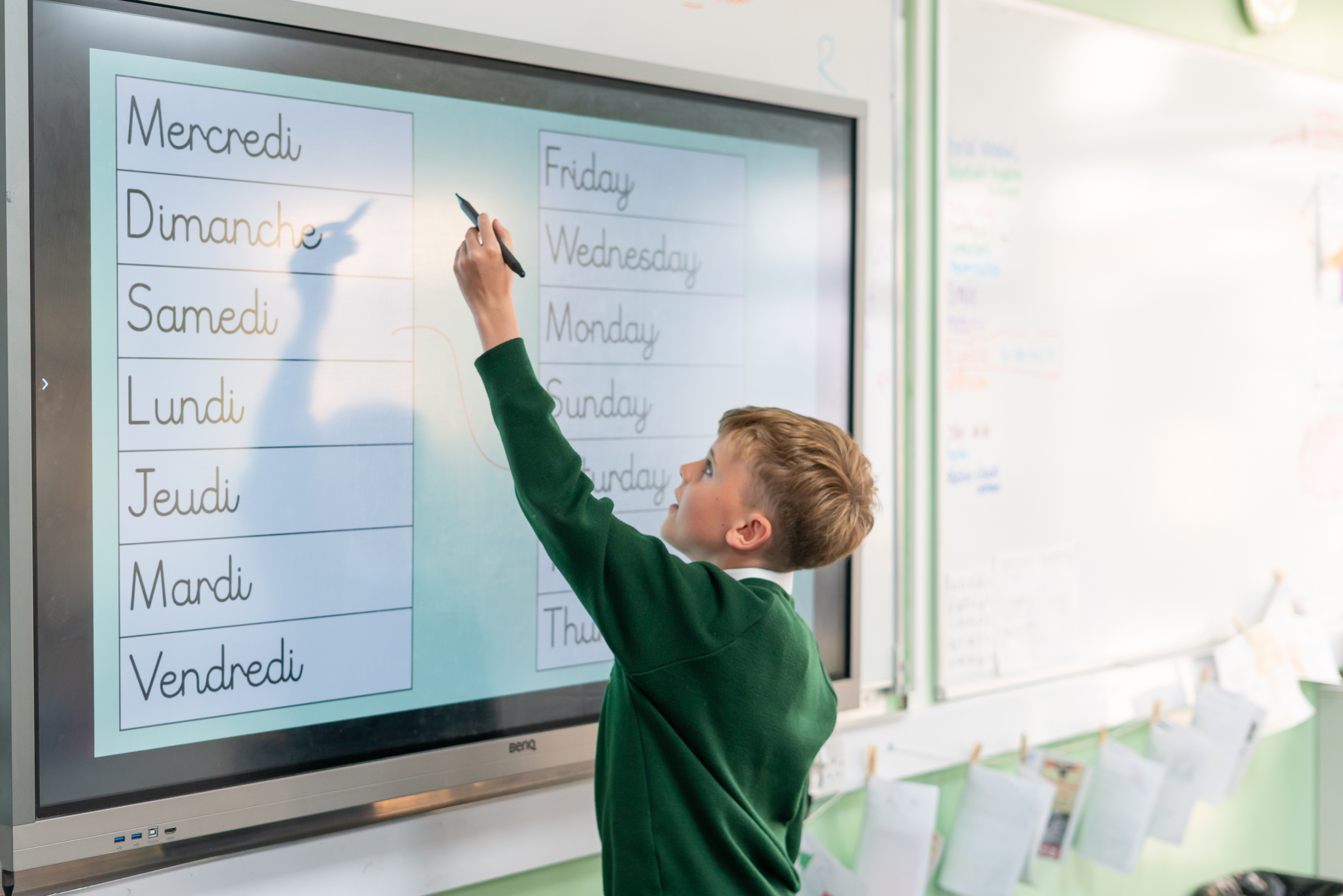Modern Foreign Language Subject Leader: Mrs S Mitchell
At Halling Primary School, we teach modern foreign languages to support the understanding of a multicultural world. French is the 5th most widely spoken language across the globe, this gives our pupils the ability to learn the basics of an additional language.
Intent
In our MFL curriculum, we strive to enable children to express their ideas and thoughts in the French language and to understand and respond to its speakers, both in speech and in writing. In line with the 2014 National Curriculum for MFL, our aim is to provide a high-quality language education which equips children to use aspects of the French language confidently and be inspired to engage with languages enthusiastically when leaving for secondary education.
We aim to:
- Provide an opening to other cultures
- Foster pupils’ curiosity and deepen their understanding of the world
- Provide opportunities for them to communicate for practical purposes
- Learn new ways of thinking
- Equip pupils to study and work in other countries
In this way they will:
- Understand and respond to spoken and written language
- Speak in the target language with increasing confidence, fluency and spontaneity
- Find ways of communicating what they want to say
- Continually improve the accuracy of their pronunciation and intonation
- Write at varying lengths
- Discover and develop an appreciation of a range of writing in the language studied.


Implementation
French is taught on rotation, for 45 minutes in all KS2 classes. Over the year, children will progress in the four skills (reading, writing, speaking and listening) as well as be taught French grammar and French culture. This will ensure progression and skills development across the key stage. During French sessions, children are given the opportunity to work as a class, as individuals and as part of a group. By its nature, MFL will involve lots of interaction with visual, auditory and kinaesthetic prompts.
These skills will underpin the lessons we deliver. Opportunities will be taken to positively promote equality and diversity. In addition, themed assemblies and events will take place over the year which will help inspire them and help them to flourish on their learning journey languages.
Impact
Our approach to the curriculum results in a fun, engaging, and high-quality language education which also equips the children to cope better with the expectations of this subject after primary school and indeed overall language in further education and future workplaces. The skills we teach should enable them to have knowledge of French and provide a platform to build from enabling them to pursue a wide range of interests and vocations in the next stage of their lives.
The quality of children’s learning is evident in their folders and evidence of activities across the school. Evidence such as this is used to feed into teachers’ future planning, and misconceptions and knowledge gaps in languages can be retaught either when teaching other curriculum areas through cross-curricular links or the following year when previous topics are revisited at a higher level. This supports varied paces of learning and ensures all pupils make good progress.
Modern Foreign Language in Each Stage
- listen attentively to spoken language and show understanding by joining in and giving simple responses
- explore the patterns and sounds of language through songs and rhymes and link the spelling, sound and meaning of words
- engage in conversations; ask and answer questions and express opinions
- speak in sentences, using familiar vocabulary and phrases
- begin to develop accurate pronunciation and intonation so that others understand when they are reading aloud or using familiar words and phrases
- repeat new ideas orally to peers
- read carefully and show understanding of words and phrases, using a word bank for support
- appreciate stories, songs, poems and rhymes in the language
- broaden their vocabulary and develop their ability to understand new words that are introduced into familiar written material
- write phrases from memory to express ideas clearly
- describe people, places, things and actions orally and in writing understand basic grammar appropriate to the language being studied, including (where relevant): feminine and masculine forms, key features and patterns of the language; how to apply these, for instance, to build sentences; and how these differ from or are similar to English
- listen attentively to spoken language and show understanding by joining in and responding
- explore the patterns and sounds of language through songs and rhymes and link the spelling, sound and meaning of words
- engage in conversations; ask and answer questions; express opinions and respond to those of others; seek clarification and help
- speak in sentences, using familiar vocabulary, phrases and basic language structures
- develop accurate pronunciation, with confidence, so that others understand when they are reading aloud or using familiar words and phrases
- present ideas and information orally to a range of audiences
- read carefully and show understanding of words, phrases and simple writing
- appreciate stories, songs, poems and rhymes in the language
- broaden their vocabulary and develop their ability to understand new words that are introduced into familiar written material, including through using a dictionary
- write phrases from memory, and adapt these to create new sentences, to express ideas clearly
- describe people, places, things and actions orally and in writing understand basic grammar appropriate to the language being studied, including (where relevant): feminine, masculine and neuter forms and the conjugation of high-frequency verbs; key features and patterns of the language; how to apply these, for instance, to build sentences; and how these differ from or are similar to English
Modern Foreign Language Progression
SEND Information
We aspire to ensure that SEND and disadvantaged children are given the necessary support in class to fully access the learning of French and embrace the culture in French-speaking countries.

